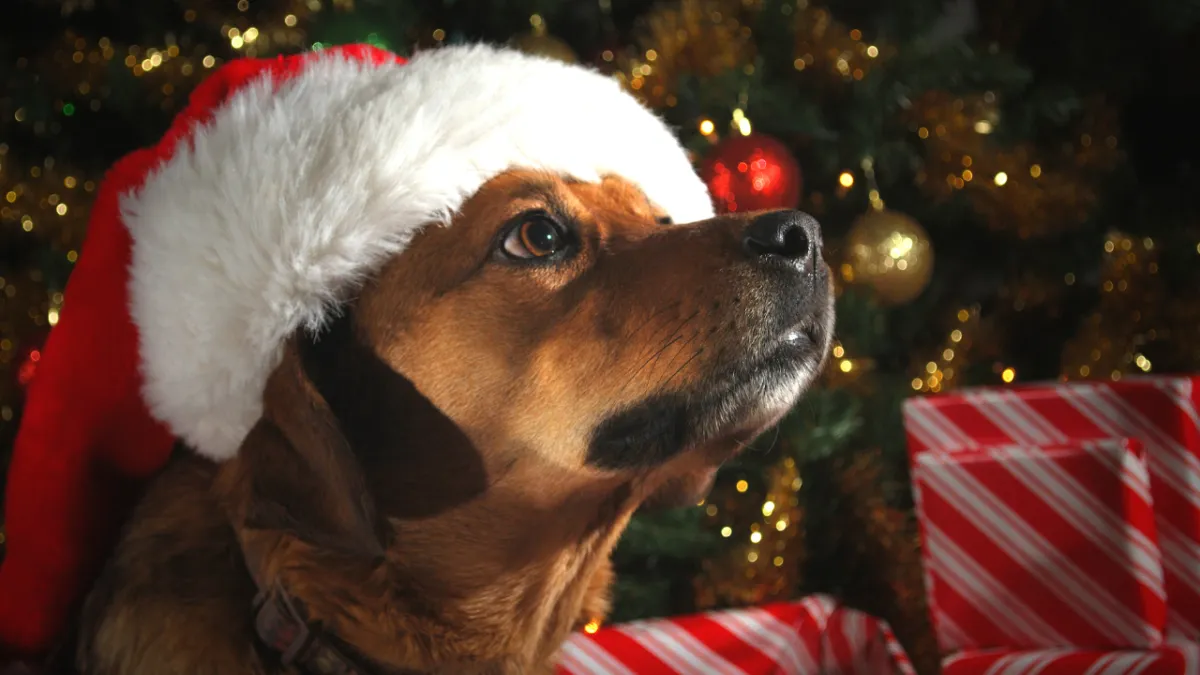Welcome to the Clever Canine Academy Blog!
learn to become your pup's favorite trainer
This is your go-to resource for practical tips, expert advice, and compassionate guidance on navigating the challenges of raising a well-behaved, balanced dog. Whether you're dealing with a new puppy, an overly aroused adolescent, or a fearful, anxious, or reactive dog, you're in the right place.
Explore articles, listen to my Clever Canine Insights podcast, or check out my YouTube channel for even more guidance to help you and your dog enjoy life together!

Calm paws for the holidays
“Life changes very quickly, in a very positive way, if you let it.” ~ Lindsey Vonn
Say goodbye to barking, lunging and jumping behaviors from your dog when holiday guests arrive this season.
The holidays are fast approaching. Family, friends and more frequent visits from your delivery services are expected. As if your life was not complicated enough, the family dog goes ballistic during this time of the year. The doorbell gets your dog barking, or, worst yet the guests are greeted by your jumping and lunging dog. Imagine instead, a calm dog that is safe and happy. That is, of course, the holiday spirit you wish for all your family and friends!

While some dogs are socially resilient and love having the attention of people, other dogs may not have the personality or confidence to deal with the stress and noise during your holiday party. This is especially the case with fearful or reactive dogs who show shy, fearful, anxious behaviors like hiding, running away, barking and growling as new people appear at the door or enter the home.
With that said, taking a few cautionary steps will ensure you, your dog, and your guests have a great holiday.
1. Know your dog's body language
Dogs communicate through body language. Learning to read your dog’s body language will help you better understand what they are trying to say as well as give you some insight into how they may be feeling in a given situation. When dogs feel unsafe or uncomfortable, they show very subtle signs of stress which include lip licking, yawning, sniffing, whales eye (white of the eye is showing like the dog below), freezing (not moving), curving their head or body away, scratching, and panting. If your dog is displaying any of these behaviors, they are telling you they feel uncomfortable and may need an intervention, removed from the situation, and taken to a quiet place to relax.

2. Provide a safe zone for your dog
Your dog should have a place to go that is away from the hustle and bustle of guests. This may be their crate, a quiet room in the home, a gated area, or even outside in a fenced area or kennel. The ideal place is one that your guests will not have access to, that can be secured so little children do not accidentally encounter your dog, and one that is escape-proof. You can gate off an area that guests will not be using like a laundry room, bathroom, or hallway. Hang a blanket over the gate to buffer sound and reduce visual stimulus.
Before the big event, place your dog in the safe zone every day. Make it a place your dog will enjoy - Feed your dog's breakfast and dinner there, As soon as your dog is done eating, let him out. Each day slowly extend the length of time your dog spends in the safe zone before releasing him.

3. Manage the door knock and door bell
Many dogs bark extensively when someone comes to the door. The sound of the knock or ring causes us to quickly jump up and run to the door. Dogs notice the pattern and may trigger anxiety in our dog. If you have a friendly dog that gets super excited or anxious about greeting people, here are some tips to help prepare for the event.
Put a note on the door: DO NOT KNOCK OR RING- CALL OR TEXT. include your number on the note. Many of my clients LOVE the idea and keep a "Do Not Knock or Ring" note on the door all year long. If we reduce the sounds that trigger your dog, then your dog will be less anxious and stop whining, pacing, and barking.

4. Provide a little more exercise and training
Keep your dog on a regular schedule the week of the party. Make sure your dog has had a good walk or run prior to guests arriving If possible, tire your dog by playing fetch, tug-of-war, or other interactive games before guests come over. An exercised dog is far less likely to be as reactive or stressed when people come over. - A tired dog is a good dog.
While we are talking about activities to engage in with your dog, you might also refresh your dog's basic obedience commands. Your dog should be responsive to your cues- sit, down, and leave it.

5. Add mental enrichment into the daily routine
Crate games, food puzzles, snuffle mats, stuffed bones and Kongs are all great ways to give your dog's brain something to do. Prepare items ahead of time and freeze food items so they last longer. Start practicing giving your dog the items in the safe zone every day for short periods of time before the party. For example, when you take a shower, prepare a meal, talk on the phone, do laundry, or get the mail. Mental activity that requires chewing and sniffing is often more calming and fatiguing than physical exercise. I had Weimaraners that could run in a field or hike for hours and come home on an adrenaline rush and do zoomies around the house for another half hour. But if I did some training with the dogs or provided some mental enrichment, they would be tired in 20 minutes!

Getting the calm dog for the holiday
The holiday visits with family and friends does not have to be hard if you are proactive in preparing your dog for the big event. A few minutes a day to train, set up a safe space, and have mental enrichment prepared for your dog will go a long way to pulling off a successful holiday visit.
By following these tips, you can help your dog feel more comfortable around holiday guests and reduce problem behaviors. Download Our Free Guide with a list of toys to use, stuffing recipes, and a source for soothing dog music and calming treats. If you have any concerns about your dog’s behavior around guests, please consult with a certified professional dog trainer or behavior consultant.
Just for you...
Use our quick calm paws checklist to prepare your dog
Here is a convenient checklist to get you started with having a stress-free holiday with your dog. Remember that taking no action will not make the problem behavior like your dog's jumping, lunging, and barking go away but likely increase the likelihood of greater stress during the holidays
provide a safe quiet place for your dog
practice short quiet times with your dog in the safe place and build longer durations
hang a sign on your front door instructing visitors to text rather than knock
take your dog out for play and exercise
add enrichment toys and activities to your home to occupy your dog
meet with a certified dog behavior consultant if you struggle with your dog's behavior
Get our top 7 pro-tips
for life with a relaxed, well behaved dog
Receive daily instructions outlining proven techniques to help you train your dog.
These simple-to-follow lessons can be practiced in just 10 minutes a day.
Learn how to train any behavior.
Learn the overlooked reason why your dog can be difficult to train
Discover why your dog ignores you and what you can do about it
Increase great behaviors and get them consistently even during distracting environments
Eliminating those annoying bad behaviors
Discover what your dog is trying to tell you and how you should respond
Tap into your dog's something and get laser focus
Set up your dog for success everytime and every where you take your dog

